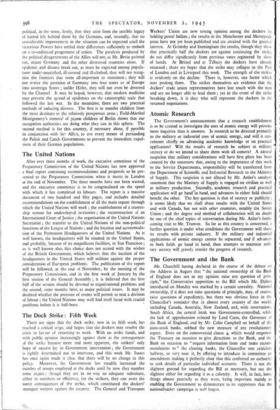The Dock Strike : Fifth Week
There are signs that the dock strike, now in its fifth week, has reached a critical stage, and hopes that the dockers may resolve the crisis in favour of returning •to work. With no strike funds, and with public opinion increasingly against them as the consequences of the strike become more and more apparent, the strikers' only hope of success lay in Government intervention ; the Government is rightly determined not to intervene, and this week Mr. Isaacs has once again made it cleat that there will be no change in this policy. Moreover, the Government has steadily increased the number of troops employed at the docks until by now they number some zo,000 ; Though they are in no way an adequate substitute, either in numbers or efficiency, for the strikers, they can avert the worst consequences of the strike, which constituted the dockers' strongest weapon against the country. The General and Transport Workers' Union arc now testing opinion among the dockers by holding postal ballots ; the results in the Manchester and Merseyside areas have not yet been published and are awaited with the greatest interest. At Grimsby and Immingham the results, though they show that practically half the dockers are against continuing the strike, do not differ significantly from previous votes registered by show of hands. At Bristol and at Tilbury the dockers have already returned ; there are hopes that the strike may collapse in the Port of London and in Liverpool this week. The strength of the strikes is evidently on the decline. There is, however, one factor which may prolong them. The strikes themselves are evidence that the dockers' trade union representatives have lost touch with the men and are no longer able to lead them ; yet in the event of the strike breaking down, it is they who will represent the dockers in the resumed negotiations.






























 Previous page
Previous page